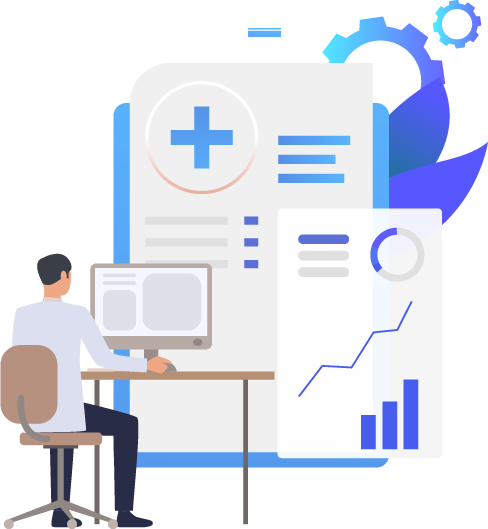Table of Content
Share This Article
- Reading Time: 7 Minutes
- Published: November 2, 2023
- Last Updated: February 10, 2025
The healthcare industry has long been plagued by inefficiencies in administrative processes and manual data entry. But technology is finally catching up, and one of the most exciting developments in recent years has been the emergence of accounts payable (AP) automation. AP automation solutions are revolutionising healthcare operations like never before by streamlining billing, payment processing, and financial management tasks from end to end. In this blog, we will explore how automated accounts payable operations are making a huge difference in terms of efficiency, accuracy, cost savings – and ultimately, patient care outcomes as well!
What is AP Automation?
One of the most important yet often overlooked aspects of healthcare is accounts payable. AP is responsible for paying vendor invoices and managing employee expense reports. It is a critical function that keeps the wheels of healthcare businesses turning. However, AP can also be a huge drain on resources. Manual processes are time-consuming and error-prone. This is where AP automation comes in. Automated accounts payable operations involve the use of technology to streamline and automate the accounts payable process. This can include everything from automating invoice processing to automating payments.
The benefits of AP automation are numerous. Perhaps most importantly, it can free up valuable staff time so that they can focus on more strategic tasks. It can also help to ensure accuracy and compliance with internal controls. Additionally, AP automation can help to improve cash flow management and enable early payment discounts. If you are looking to improve your accounts payable process, AP automation may be the answer. Let us learn some more benefits to gain a detailed understanding.
Benefits of AP Automation for the Healthcare Industry
-
Improved Patient Care:
One of the primary benefits of AP automation for the healthcare industry is that it can help to improve patient care. When invoices are processed automatically, they can be routed to the appropriate department for review and approval much more quickly. This means that payments can be made faster, which can lead to better patient care. In addition, AP automation can help to reduce errors in processing invoices, which also leads to improved patient care.
-
Reduced Costs:
Another benefit of AP automation for the healthcare industry is that it can help to reduce costs. Automated accounts payable processes can help to eliminate paper invoices, which can save significant amounts of money each year. In addition, automating AP processes can help speed up payment processing times, which can save on late payment fees and interest charges. Furthermore, it can free up staff time so that they can focus on other tasks that contribute to improving patient care or reducing costs elsewhere in the business.
-
Enhanced Accuracy:
Accounts payable automation improves accuracy and efficiency in data management. By utilising the latest cloud-based accounting software, healthcare businesses can ensure that each payment made is properly accounted for, avoiding errors that could negatively affect relationships with vendors or suppliers. Additionally, automating payments reduces the need for manual data entry, which saves time and resources.
-
Better Financial Control:
Another benefit is enhanced financial control with real-time visibility into cash flow and spending patterns at any given moment. Automation enables healthcare providers to streamline their invoice processing workflows and reduce manual intervention in payment processes. This improves accuracy, eliminates errors, and reduces the risk of fraud. By automating accounts payable, hospitals can ensure a positive cash flow as they have visibility into incoming invoices, payment status, and upcoming liabilities. All these factors contribute to gaining better financial control for healthcare industries by reducing operational costs and enhancing productivity.
-
Improved Cash Flow:
With the growing demand for healthcare services, medical facilities are dealing with an ever-increasing volume of invoices and payments, which can be a major financial burden if managed manually. With automated accounts payable systems in place, healthcare businesses can enjoy improved cash flow management as they maintain visibility into their financial operations through real-time reporting. In addition, they will be able to track expenses effectively and identify potential cost-saving opportunities that may arise.
-
Increased Security:
Automated accounts payable process helps increase security by controlling access to sensitive information, such as invoices from external parties, through encryption protocols and multi-factor authentication techniques.

Challenges of Implementing AP Automation in the Healthcare Industry
Despite the clear benefits that AP automation can bring to the healthcare industry, there are still some challenges that need to be addressed. One of the biggest challenges is the lack of standardisation across different healthcare systems. This can make it difficult to integrate automation into existing workflows.
AP automation brings the challenge of the high cost of implementing automation solutions. This is particularly a problem for small and medium-sized healthcare businesses that may not have the budget to invest in these technologies. However, such a challenge can be tackled by investing in an outsourced accounting team. With outsourced accounting and bookkeeping services, healthcare businesses gain access to the latest accounting software without incurring high costs of purchasing the software. Another challenge faced by the healthcare industry when it comes to automation is resistance from employees. Many workers are understandably resistant to change, and this can make it difficult to get everyone on board with using new technologies.
AP Automation requires integration with existing systems and procedures, which can be time-consuming and expensive. Additionally, healthcare businesses handle sensitive patient information that must be protected from cybersecurity threats. This entire process can be cumbersome to manage through an in-house team. Thus, it is better to consult a team of experts proficient in different automated tools and capable of maintaining the confidentiality of your sensitive financial data. One way to gain access to such experts is to hire outsourced service providers proficient in providing quality healthcare accounting services. They comprise a team of highly skilled professionals capable of handling large amounts of data and streamlining your overall accounts payable process.
Overall, addressing these challenges requires careful planning and collaboration between IT professionals, finance teams, procurement managers, and other stakeholders involved in AP processes. By overcoming these hurdles proactively with the right solutions tailored specifically for the healthcare industry – businesses can streamline their workflows effectively while minimising potential risks associated with traditional manual methods.
Best Practices for Implementing AP Automation in Healthcare
-
Defining and Documenting Business Requirements:
AP automation can be complex, so it is important to clearly define what you need the system to do. Work with all relevant stakeholders, including finance, accounting, and operations, to document business requirements.
-
Selecting the Right Technology Solution:
Not all AP automation solutions are created equal. When evaluating options, consider factors such as ease of use, integration capabilities, and price. Furthermore, if you plan to outsource your AP process, selecting and hiring the right healthcare accounting services provider also requires evaluating options like pricing, customer service, experience, etc.
-
Streamlining Processes:
Once you have a new AP automation system in place, take time to streamline your overall AP process. This may include reevaluating approval workflows, implementing electronic invoicing, and setting up electronic payments. However, if you find it difficult to manage everything on your own, you can trust experts proficient in healthcare accounting and bookkeeping.
-
Training Employees:
A successful AP automation implementation requires buy-in from all relevant employees. Make sure everyone understands how the new system works and how it will benefit them in their day-to-day work.
-
Monitoring Performance:
After going through all the effort of implementing AP automation, do not forget to monitor its performance over time. Regularly review KPIs such as invoice processing time and accuracy to ensure the system is meeting your expectations.
Final Words
All in all, AP automation is revolutionising the way healthcare providers handle their accounts payable processes. The technology helps to automate manual tasks and reduce the amount of time it takes to manage invoices, allowing healthcare providers to stay on top of payments and keep accurate records. Furthermore, AP automation also offers a variety of other benefits, such as improved visibility and control over finances with real-time analytics and greater accuracy in payment processing, which leads to fewer errors and cost savings. By improving accuracy and reducing errors significantly, hospitals can focus on their core competency – providing quality patient care!

Get customized plan that supports your growth

Thousands of business owners trust Whiz to manage their account
Let us take care of your books and make this financial year a good one.








